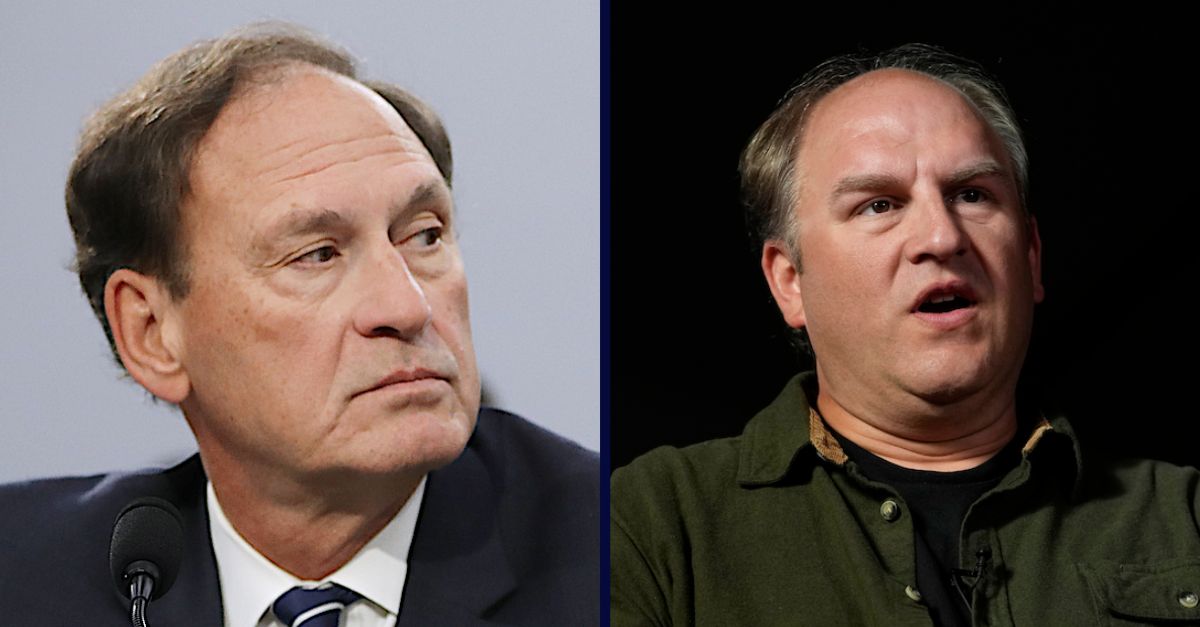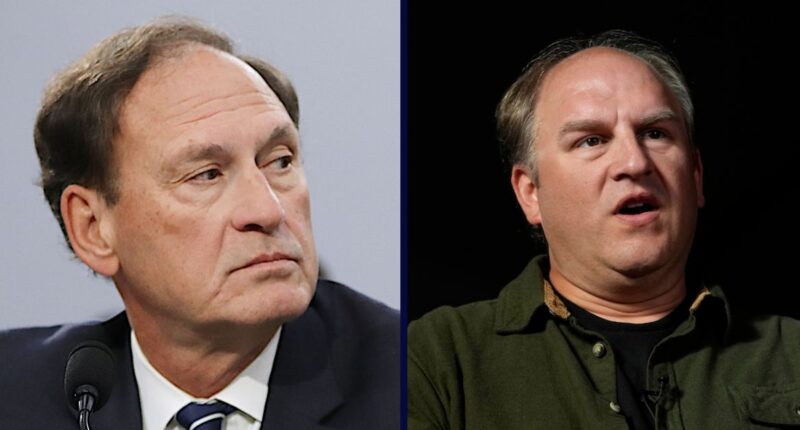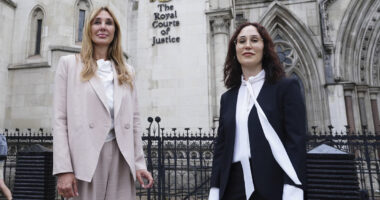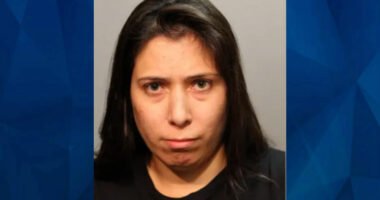
Left: Samuel Alito appears in a file photo taken during March 7, 2019 testimony about the Supreme Court’s budget (via Chip Somodevilla/Getty Images). Right: Gerald Groff, a former postal worker whose case will be argued before the Supreme Court, speaks during a television interview with the Associated Press at a chapel at the Hilton DoubleTree Resort in Lancaster, Pa., Wednesday, March 8, 2023 (AP Photo/Carolyn Kaster).
The majority-conservative U.S. Supreme Court appears poised to overturn a decades-old legal precedent — one that has long set the rules for how far employers must go to accommodate their employees’ religious practices in the workplace.
The justices heard oral arguments Tuesday in the case of Gerald E. Groff, an evangelical Christian postal worker who says his religious freedom was violated when he was forced to surrender his job as the only means of avoiding delivering Amazon packages on weekends. Groff’s lawyers urged the justices to overrule the 1977 landmark case of Trans World Airlines v. Hardison, which interpreted the requirements of Title VII of the Civil Rights Act for religious accommodations in employment.
In that case, the Supreme Court held that employers could not fire workers for practicing their religion unless the employer can show that accommodating the religious practice would pose an “undue hardship” on the employer that would require more than a minimal cost.
Sunday Amazon delivery causes a conflict with religion
Groff is an evangelical Christian and Sunday Sabbath observer who worked for the U.S. Postal Service (USPS) in Lancaster County, Pennsylvania, for several years starting in 2012. One year after Groff started working with the USPS, the agency began contracting with Amazon for package delivery, and under the terms of the contract — and the collective-bargaining agreement that bound USPS employees — postal workers were obligated to work at least some Sunday shifts as a result.
At first, Groff requested reassignment to another post office branch that did not participate in Sunday deliveries. Later, that branch also began to offer Sunday deliveries. Groff’s supervisor initially permitted Groff to find substitute coverage for the required Sunday shifts, but Groff was inconsistent in doing so. As a result, Groff missed more than two dozen assigned Sunday shifts.
By 2019, Groff was aware that termination was a likely consequence of the missed shifts, and he resigned from his position with USPS that year. Groff then filed a federal lawsuit alleging that the USPS, led by Donald Trump appointee Postmaster General Louis DeJoy, illegally discriminated against him by failing to provide an appropriate accommodation for his religious observance. He is represented by conservative advocacy group First Liberty Institute, Baker Botts LLP, the Church State Council, and the Independence Law Center.
The USPS won at the summary judgment phase after both the district and circuit courts applied the Hardison rule. Groff, naturally, appealed.
A chasm dividing the justices
As expected — given recent rulings involving the limits of First Amendment protection of religious liberty — the justices arrived at the Groff arguments with vastly differing perspectives on respecting past precedent generally as well as on religious liberty specifically.
Justices Sonia Sotomayor and Elena Kagan were unreceptive as Groff’s attorney Aaron Street advocated for the Court to overrule Hardison’s interpretive rules for Title VII’s requirements.
“When there’s a statute involved, stare decisis is at its peak,” commented Kagan who explained that consistent judicial guidance on interpreting a statute is critical to maintaining the credibility of the judicial system. “You can count on a finger how many times we have overruled a statutory ruling,” Kagan added.
When United States Solicitor General Elizabeth Prelogar took the podium for the Department of Justice, Justice Samuel Alito immediately began to champion the rights of “minority religions.”
“I’m really struck,” Alito told Prelogar. “We have amicus briefs from many minority religions — Muslims, Hindus, Orthodox Jews, Seventh-Day Adventists — they all say … Hardison has violated their right to religious liberty.”
Prelogar assured the justices that under the current legal framework, employers are routinely required to provide religious accommodations to employees who require scheduling changes, dress code modifications, or religious expression in the workplace.
Prelogar told the justices she has “great attachment” to the body of law developed after Hardison on which many employers have long relied to shape their employment policies. She urged the Court not to “just throw it up for grabs” and rule to make well-settled precedent irrelevant for employers to understand their obligations to employees.
Alito, though, did not appear convinced.
He reminded Prelogar of the facts of a 2015 case in which a Muslim woman denied a job for wearing a hijab won an 8-1 verdict against clothing retailer Aberbrombie & Fitch. Alito voted with the 8-member majority in that case — including the late Justice Antonin Scalia — leaving stalwart conservative Justice Clarence Thomas as the lone dissenter.
Alito added additional facts to create a new hypothetical, asking what would happen if employees had a “fierce reaction” or even quit in reaction to an employer’s accommodating an employee’s practice of wearing a head scarf.
Prelogar maintained her position that even Alito’s hypothetical was an insufficient rationale for overturning Hardison. “Mere coworker grumbling or even hostility to religious practice” is not a cognizable injury under the current legal framework, explained Prelogar.
It was Chief Justice Roberts, however, who pointed out the true legal complexity facing Groff’s case: that Supreme Court cases since Hardison have seriously changed legal standards for how “religious exercise” is protected. The chief justice referred specifically to one case in which the Court held that Maine taxpayers must foot some of the bill for parochial school tuition, and another in which the Court emphasized the role of teachers within the context of religion. In both cases, the court’s conservative majority took a position that widened the scope of permissible religious exercise by government employees — holdings that are at odds with Hardison-era jurisprudence.
Several current justices have vocally supported an expansion of what conservatives describe as religious liberty rights. Alito, for example, Alito said publicly last summer that religion is “under attack” in the United States. Justice Neil Gorsuch formally overruled the 1971 case of Lemon v. Kurtzman, which had limited the extent to which public school teachers could lead or participate in prayers with students on school grounds.
Though stare decisis is typically a monumental hurdle to clear, the Groff case is proceeding before a bench that has already shown a willingness to jettison settled precedent, particularly in the area of religious expression.
You can listen to full oral arguments in the Groff case here.
Have a tip we should know? [email protected]








